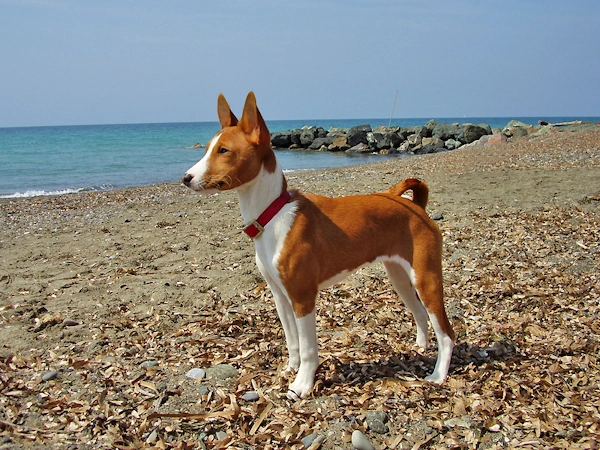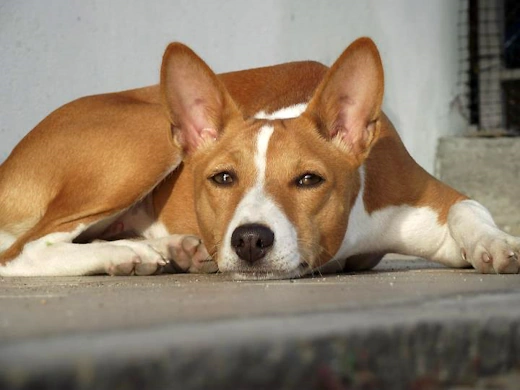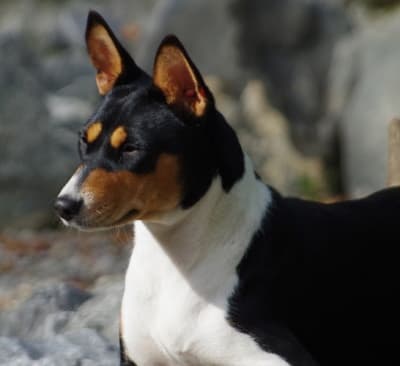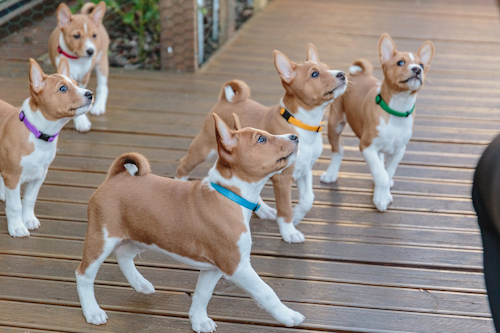Basenji Dog Breed
The Basenji dog breed, also known as the African Barkless Dog, is native to central Africa and is a very old breed. There is evidence of this from depictions of their likeness found in Egyptian tombs, though there are differing opinions about the breed's ancestry.
 Gaia
GaiaSome believe that this dog descends from the Spitz breed due to its
physical similarity. While others, think it was developed from pariah
type dogs in Congo region of Africa, specifically as a hunting dog.
Basenji Dog Breed Characteristics
There is no doubt of the Basenji's bravery, stamina and excellent ability to hunt, both by sight and scent. And these
skills are still used in its native lands to this day.
One of the most unusual facts about the Basenji dog breed is that it does not
bark. It does, however, make other noises which sound similar to laughing or yodeling.
Basenji Physical Stats

Height: 16-17 inches
Weight: 22-24 lbs.
Color variations: Red; black, black and white; red and white; black, tan and
white; black brindle and white. They all have white feet.
This breed has an elegant, well-balanced look and carries its body with a confident posture. The face has a very alert expression, but the forehead creases tend to give it an inquiring gaze.
The coat is sleek and fine. The Basenji dog breed is almost odorless, has very clean habits and likes to take care of its own grooming, much like a cat. And, also similar to the cat, they don't like water or going out in the rain.
Basenji Health
This breed is considered to be generally healthy and has a lifespan of 13 to 14 years with good care and veterinary oversight.
Health disorders that may affect the Basenji during its lifetime include:
- Hypothyroidism,
- IPSID a type of inflammatory bowel disease
- Canine hip dysplasia
- Cataracts
- Fanconi syndrome, a kidney disorder (Gene tests are available to identify carriers)
- Progressive retinal atrophy, or PRA (Gene tests are available to identify carriers)
Because tests are available to screen for carriers of the
serious diseases, breeders can use this information to choose
appropriate parents to prevent passing along these conditions.
The National Breed Club of the Basenji recommends these tests:
- Hip Evaluation
- Thyroid Evaluation
- Progressive Retinal Atrophy (Basenji) (PRA) - DNA Test
- Fanconi's Syndrome, Paradoxic glucosuria - DNA Test
- Ophthalmologist Evaluation
These health topics are good to keep in mind when seeking a puppy and meeting with a breeder!
Grooming
The Basenji has a flat coat that sheds lightly all year round. Although
the coat hair is short it still needs to be brushed a couple of time a
week to remove the dead hair.
This can be done with a de-shedding glove or tool
very effectively especially after a bath when the coat is still damp.
An optional tool for short-haired dogs that is popular is the curry comb.
In addition to a regular brushing routine, teeth and ears need to be
cleaned about once a week and nails inspected for clipping if necessary.
Be gentle and use caution when cleaning the ears.
Generally a bath is only required every couple of months.

Basenji Temperament
Basenji dogs are friendly and affectionate, but they are also known to have a proud and independent side to their
nature. They are cautious, though not aggressive, with strangers and like to be approached on their own terms.
This dog is very intelligent and known to be crafty in getting its way. Owners need to be able to stay one step ahead
of them to maintain their leadership role.
Basenjis are very fastidious and are reputed to be easy to house train. and get along well with other dogs. The breed is very curious and fun-loving and likes to play a lot.
They don't enjoy being left alone and tend to get into mischief if bored. Toys are very welcome diversions for them, especially indestructible dog toys to satisfy their insatiable interest in chewing.
Even though they don't bark, they are good watchdogs and will let you know, through a repertoire of other noises, if there is something you should check out.
How Active Is The Basenji?
The Basenji dog breed has a lot of energy and needs a couple of long daily walks. They can become destructive if not sufficiently exercised.
Ideal activities to engage the Basenji both mentally and physically would be lure coursing and agility. Lure coursing in particular would match their high prey drive and fast running skills.
They also really like to play, so if you want to burn off some more of that energy, take them outside if you have a securely fenced yard for very active play sessions.
But be warned, they are known for being clever escape artists and agile jumpers, so make sure the fence is high with no loose boards.
Ideal Living Space
The ideal environment for Basenji dogs would be any residence that has ample room outside to run and play.
Apartment is not a good choice due
to the high activity level of the breed and the need to get outside for
exercise.
Also, Basenji dogs
don't like being left alone and are likely to start "yodeling" or making sad noises similar to the sound of
a baby crying, which may be confusing to neighbors.
One thing to keep in mind as mentioned earlier, is that the Basenji is a wily dog that will take advantage of any chance to escape, particularly if something ignites his prey drive.

Children and Basenjis
A good dog for older and more mature children who can convey leadership.
Basenjis are affectionate but also high energy. Activities involving children and pets should always be supervised by an adult.
This is especially true in households with small children where chasing each other can get out of hand.
The Basenji With Seniors?
While Basenji dogs usually bond deeply with humans in a caring and
affectionate way, this breed may not be suitable for families that
cannot provide significant daily walks and other exercise opportunities.
To Read A Comment from one of our visitors about their Basenji, go here
Before You Go...
If you like the content of this page, as well as others on my site, please give it some love by clicking on the heart in the lower right hand corner. This helps me keep providing enjoyable and useful content.
Thank you.
Book Recommendation
- Home › ›
- AKC Breeds ›
- Basenji Dog
Gaia image cropped: https://commons.wikimedia.org Gaia_Basenji.jpg by Author fugzu https://creativecommons.org/licenses/by/2.0



